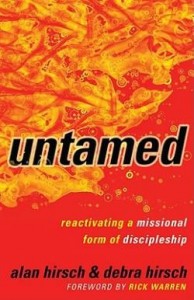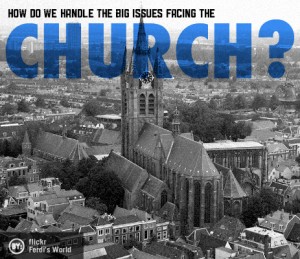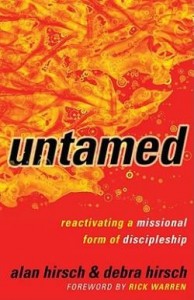This is part two of my book review of Alan and Deb Hirsch’s book Untamed: reactivating missional discipleship. See part one.
God-centered Discipleship
Given the age of programs, systems, and missional techniques, it was very refreshing to see the Hirsch’s start off with a profound theological focus. Chapter Two lays a God-centered foundation for discipleship by explaining the difference between a healthy and a sick disciple. The Hirsches set the tone by saying: “A book on missional discipleship must first get the basics right in relation to God.” They make it clear that missional discipleship isn’t about being trendy or socially active; it’s fundamentally about worshiping God. They write:“If we are going to be missional disciples then we need to put our best efforts into knowing God, into the pursuit of the Holy.”
Shema Spirituality (holistic discipleship)

The problem with every disciple is that we worship things and persons other than God. Drawing on Lewis’ distinction between ordinate and inordinate love, they point out that the sick disciple is one who inordinately loves anything other than God (very Augustinian). A distinction is made between idol worship and worship of the one, true God, what they call Shema Spirituality. No, it’s not Eastern mysticism, it’s based on the Great Shema of Deuteronomy 6 which tells us to love the Lord our God with all our heart, soul, and mind. “Discipleship is loving God first and foremost, and then loving everything else in light of that love.”
True discipleship involves a right knowing of God, and right knowing includes feeling, thinking, and acting. Mature disciples grow in all three areas. They note that these ways of loving God are more natural to some than others. In fact, each way of Shema spirituality tends to align with certain spiritual leaders: Pastor (feeling), Activist (acting), and Theologian (thinking). Each of these types of leaders need to spend time with one another for mature discipleship to come about. And all disciples need all three types of people in their lives.
Reflect on your Discipleship
We do well to pause and consider where we need to grow as disciples—as theologians, pastors, or activists? Are there other Christians in your life that can “round you out” to foster a God-centered knowing and maturity in your discipleship? If so, ask them to lunch and explore ways you can grow together as disciples of Jesus. As with every chapter, the Hirsches provide helpful application points and questions for discussion.

 If you are curious about how
If you are curious about how 
